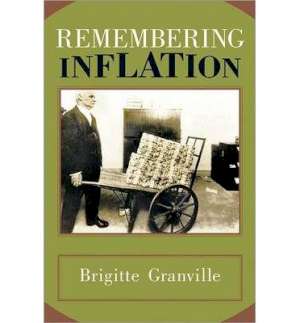28 September 2015
Remembering Inflation
Brigitte Granville
2013, Princeton University Press, 222 pages, £24.95
Reviewer: Duncan Brown, UK Commission for Employment & Skills

This book sets out to summarise what we know about inflation – its consequences, its causes, and how it can be controlled. Brigitte Granville’s motivation, as her title suggests, is to act as a cautionary reminder. In Britain as in most other advanced economies, house prices aside, it has been more than two decades since inflation was anything other than low and for the most part stable. Granville’s concern is that we may begin to forget why and how inflation is to be kept at bay.
The book starts with a broad, accessible survey of the consensus on the economics of money and inflation. With the aid of some monetary history, Granville assembles the key precepts: money is ultimately neutral; expectations matter; rules beat discretion; and hard-won credibility gives monetary policy the force to beat inflation without doing too much damage along the way. There is an important story here about the power of economics to understand and solve problems, even if implementing those solutions is no simple matter.
Granville explains that monetary policy’s power is limited and conditional: it can’t do more than control inflation, and it can only do that if it is working on sound foundations. Prudently-managed public finances, healthy financial institutions and the right political culture are all preconditions for lasting monetary stability. Granville is particularly clear on the ‘unpleasant monetarist arithmetic’ whereby fiscal weakness can quickly come to undermine monetary policy.
The later chapters turn to some of the concerns which have risen to prominence since the end of the Great Inflation of the 1970s and 1980s: financial stability, and the effects of globalisation. In keeping with the approach taken throughout the book, there is a healthy mix of theoretical exposition, historical narrative and empirical evidence, and particularly in discussing financial stability, a reluctance to avoid the trade-offs at hand. There is also an interesting tangent on the intellectual legacy of John Law, Richard Cantillon and Adam Smith and how they bear on today’s debates about money, credit, and the sharing of risk in the financial system.
When it comes to globalisation, Granville dismisses – quite rightly for this reader – claims that increased import competition through globalisation makes domestic inflation somehow impossible. Granville is also surely right to say that falling import prices matter little for inflation, in that they can be balanced by domestic monetary expansion. She then moves on to the financial dimensions of globalisation, and especially the accumulation of vast foreign exchange reserves in emerging economies, such as China; this discussion is especially timely given current developments.
In a cautionary work, the author really has to portend a little, and Remembering Inflation is no exception. Published in 2013, Granville concludes with a warning that the UK’s above-target inflation, slow growth and rising public debt were creating the conditions, alongside the shift to unconventional, discretionary monetary policy justified in recession, for a resurgent risk of inflation. In 2015, with the economy growing, inflation near zero, it would be easy to dismiss what Granville herself accepts could be seen as scaremongering.
In fairness, Granville’s point is not that she can predict, but that if risks to credibility and public solvency are left unattended, then inflationary problems – through rising debts creating time-inconsistencies – can ultimately emerge with little warning. On this point, if not necessarily on the assessment of those risks, I think most of us would agree. Remembering Inflation provides a valuable service in reminding us that inflation is less conquered than it is contained; it takes a large literature and lays it out in an informative, readable manner.
